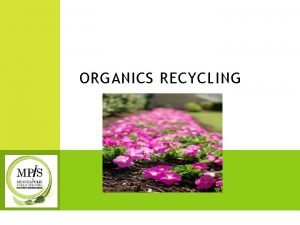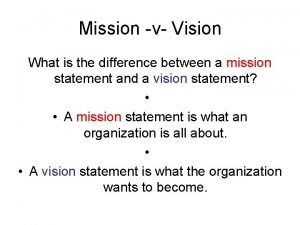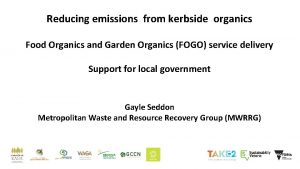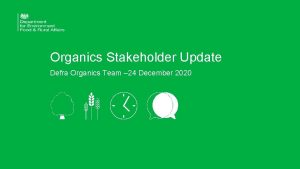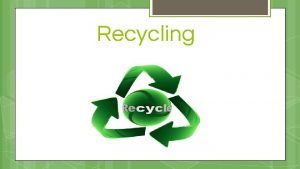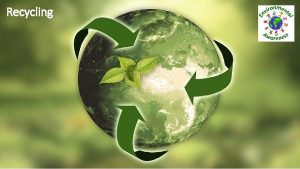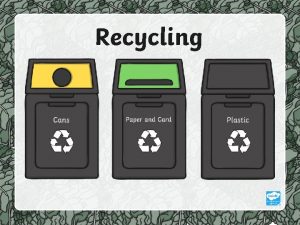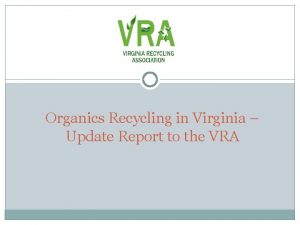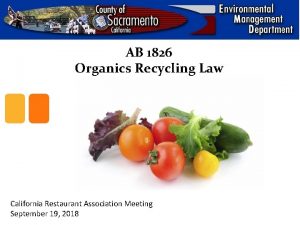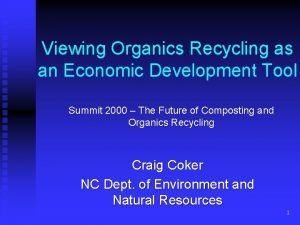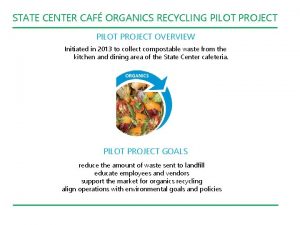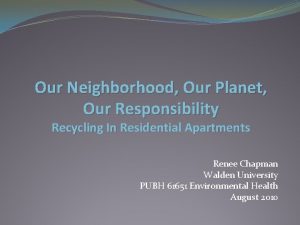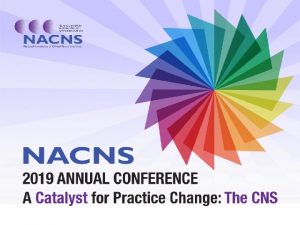WELCOME Our mission is to advance organics recycling





















- Slides: 21

WELCOME

Our mission is to advance organics recycling in South Africa for the benefit of our members, the communities in which they work and the environment

Our Members We represent the organics recycling industry in South Africa and our members including compostable packaging companies and organic waste processors

Compostable Plastics We aim to ensure that certified compostable plastics are correctly sourced, identified, separated, transported and processed to produce a compost that has value and contains no harmful residues.

Biodegradable vs Compostable Banana peels are biodegradable PLA cups are compostable – must be composted to ensure they breakdown Could potentially increase littering due to misconception

Types of Compostable Plastic Packaging • Compostable Service ware – cutlery, cups, plates from takeaways and coffee shops • Food Packaging – food purchased at a retailer and taken home by consumer eg bag of nuts or dried fruit • Small packaging items (frequent contamination of compost) sugar sachets, bread tags, plastic wrapped tooth picks, swizzle sticks, cucumber wrap

Types of Compostable Plastic Packaging • Compostable Service ware – cutlery, cups, plates from takeaways and coffee shops. • Disposal Options: – Landfill bin: street or office bin – recycled through dry recycling service – sorted and sent for composting at industrial composter or landfilled – Home composting (may not be home compostable)

Types of Compostable Plastic Packaging • Food Packaging – purchased from retailer and taken home by consumer • Disposal Options: – Collected by municipality for landfill – recycled through dry recycling service – sorted and sent for composting at industrial composting if correctly labeled – Home composting (may not be certified for home composting)

Types of Compostable Plastic Packaging • Small packaging items – generated in kitchens from restaurants and hotels • Disposal Options: – Collected by municipality for landfill – Home composting (small items more likely to be home compostable) – Source separated with food waste for industrial composting resulting in less contamination

Separation: With food waste or with dry recycling? Restaurant/Takeaway/Coffee Shop: Uses a food waste composting service and compostable products are included in food waste bins Risk of contamination with plastics

Separation at source or at recycling facility Compostable products are sorted at source or included with dry recycling (plastic, paper, glass and tins) and sorted at recycling facility for composting if available or sent for landfilling Sorter training very important

Suppliers of Compostable Plastics • Currently only a few suppliers have the correct certification with clearly marked conformity logo on the product. • In some cases it is difficult to get the South African supplier to disclose their compostability certificates as it will reveal their Chinese suppliers

How do composters decide whether they accept compostable plastics • Should a composter accept product for composting when the importer won’t provide the compostability certification? • Certification is produced by the supplier but there is no conformity logo on the product linking the product to the certificate • Products are not easily distinguished from plastic products and not clearly labelled increasing the risk of contamination for the composter • Extra processing is required eg shredding or soaking

Which fork is compostable?

Difficult for sorters to identify • Recycling sorting staff need to be trained to correctly identify compostable products • Only compostable or only plastics products should be used in a closed system to eliminate confusion • This PLA and Compostable logo is not the correct conformity logo confirming compostability so it is questionable whether the composter should accept it for composting

Current labeling: difficult to distinguish from plastic coffee cup lids Product does not have correct conformity logo on it – PLA 7 logo is not sufficient to prove compostability

ORASA has drawn up draft field testing guidelines for composters • Guide to assist composters to test products according to their specific composting methods • Will prove degradability but will not be able to detect residual chemicals • Will determine whether certified products (laboratory certified) are compostable at local composting facilities

Processing Costs: Gate fees • Considering the potential contamination of compost with plastic and potential extended composting time of compostable plastics – Will it be economically viable for composters to accept compostable plastics? – Will waste producers want to pay a gate fee that will make the extra effort worth it for composters?

Protecting our soils for the future • Compostable plastics will require huge investment in composting facilities to handle the large volumes of waste that could potential be generated • Compostable plastic waste will ultimately end up in the soil which is vital for food production. It is important that only genuine compostable plastics are accepted for composting so as to ensure our soil is protected

Thank You Melanie Ludwig Chairperson info@orasa. org. za www. orasa. org. za

 Midwest organics recycling
Midwest organics recycling Wise men three clever are we
Wise men three clever are we Our church's wider mission
Our church's wider mission Vision and mission difference
Vision and mission difference Our mission at aveda
Our mission at aveda Ppmds
Ppmds Welcome to our class
Welcome to our class Welcome to the english class
Welcome to the english class Welcome to our class
Welcome to our class Www.assignment
Www.assignment Welcome to our lesson
Welcome to our lesson Welcome to our presentation
Welcome to our presentation Our sunday morning
Our sunday morning Assaignment
Assaignment Welcome to our lesson
Welcome to our lesson We are honored to have you as our guest
We are honored to have you as our guest Passover is in late march or early april
Passover is in late march or early april May the risen christ
May the risen christ Welcome to my class
Welcome to my class Welcome to our class
Welcome to our class Welcome to our first meeting
Welcome to our first meeting Welcome to our first meeting
Welcome to our first meeting
